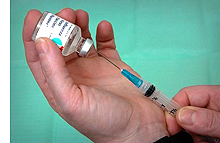|
In our community, we are exposed to different infectious diseases caused by microorganisms such as bacteria, viruses, parasites and fungi. Diseases can be spread directly or indirectly by sneezing, coughing or touching something that contains the microorganisms from one person to another. However, some diseases can be transmitted via bites from insects or animals. Others are acquired by ingesting contaminated food, water or other agents in the environment. The most common infectious diseases include chickenpox, tuberculosis, hand, foot and mouth disease, hepatitis A and B, etc. Most of the common infectious diseases may be resolved spontaneously or will be resolved with medical treatment. Compared with a few decades ago, Hong Kong people nowadays suffer less from infectious diseases due to improvement in socio-economic status and hygienic conditions. However, infectious diseases prevention and control are still very important. Most of these diseases including influenza can be preventable with attention to personal hygiene, proper lifestyle, general cleanliness and vaccines.
For chickenpox and hand, foot and mouth disease, the diseases are mainly spread through droplets when infected people cough, sneeze or talk, or spread by direct contact with the secretions of infected persons.
For tuberculosis, it can be spread through air. When the infected person coughs or sneezes, the mycobacterium gets into the air and this can result in infection if a susceptible person is in contact for a prolonged duration.
For hepatitis A, the common modes of transmission are consuming water or food especially seafood with fecal contamination. For hepatitis B, routes of transmission include perinatal transmission, i.e. a carrier mother transmits the virus to an infant, blood contact and unprotected sexual contact with a hepatitis B carrier.
Prevention:
A. Maintain good personal hygiene:
- Always keep hands clean by frequent hand washing with liquid soap, especially after sneezing and after using toilet.
- Cover mouth and nose when sneezing and coughing, and dispose sputum or secretions wrapped in tissue paper into rubbish bins.
- Wear a surgical mask when having symptoms of respiratory infection or fever.
- Do not touch eyes, nose and mouth with bare hands.
- Poultry and eggs should be thoroughly cooked before eating.
- Avoid close contact such as hugging, kissing, sharing eating utensils, etc., with infected persons.
- Follow safe sex practices and use a condom every time.
- Avoid sharing personal items such as brushes, toothbrushes and combs.
- Build up good body immunity by having adequate rest, a balanced diet, regular exercise. Do not smoke and avoid overstress.
B. Maintain good environmental hygiene:
- Maintain good indoor ventilation.
- Avoid going to crowded and poorly ventilated public places.
- Home should be cleaned thoroughly at least once per week with 1 in 99 diluted household bleach.
C. Travel health advice:
- Before departure: If feeling unwell such as having fever, sore throat or cough, consult doctors for advice.
- When travelling outside: When travelling to country with potential outbreak of avian influenza, avoid touching birds, poultry or their droppings and avoid visiting poultry markets. If feeling unwell, put on a mask and seek medical attention immediately.
- After returning home: If having flu-like symptoms, consult doctors promptly and inform the doctor of the recent travel history.
D. Vaccination:
 Chicken pox: The vaccines are given in a series of 2 shots for adult and 1 or 2 shots for kids. Chicken pox: The vaccines are given in a series of 2 shots for adult and 1 or 2 shots for kids.- Tuberculosis (TB): BCG (Bacillus Calmette-Guerin) is a vaccine for TB. This vaccine is often given to infants and small children in countries where TB is common.
- Hepatitis A: The vaccines are given in a series of 2 shots and are available for persons of 1 year of age and older for long-term prevention of HAV infection.
- Hepatitis B: The vaccines are given in a series of 3 shots and are available for all age groups to prevent HBV infection. Blood tests before and after the vaccination are recommended.
The information given above is for general references only. Infected persons should refrain from work or school, and consult a doctor to understand the condition and follow the doctor’s advice regarding treatment. For more information, please visit the website of the Centre for Health Protection of the Department of Health at www.chp.gov.hk or contact the university clinic at 2358 6670 or email to hkustclinic@pacifichealthcare.com.hk(This article is written by Health Concepts Ltd., the HKUST's medical clinic operator.)
|